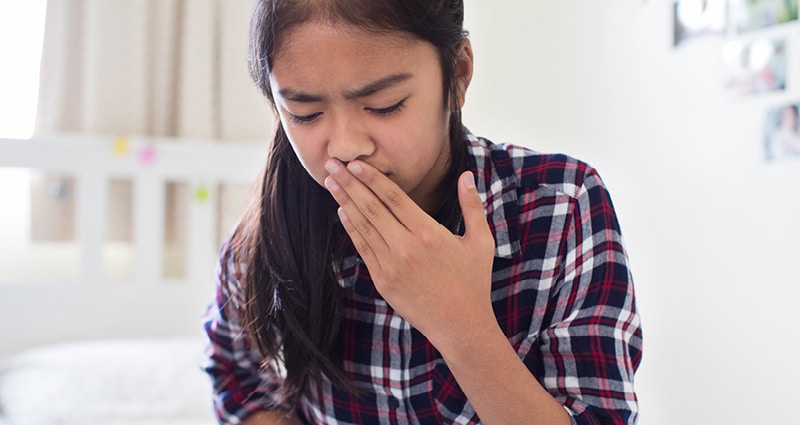Tummy bug got your little bug down?
Gastroenteritis, also known as a “stomach bug,” causes vomiting and/or diarrhea. It is usually caused by a virus but can also be caused by bacteria or parasites.
Preventing dehydration is the most important concern when children are losing a lot of fluid from throwing up or having diarrhea. Dehydration can occur quickly in young children. If your child has a dry mouth, no tears, decreased or dark urine, or lethargy, they could be dehydrated.
Hydration Tips During Illness
If your child is vomiting, give an electrolyte solution in small volumes frequently until urine output improves. Pedialyte® is the most widely known brand. These are designed to replace fluids and minerals, like sodium and potassium, safely.
Avoid cow’s milk, juice and soft drinks. Breastfed babies may continue to nurse. Most children can tolerate small sips without vomiting and can be rehydrated orally.
When your child is vomiting, only offer a little fluid at a time, just an ounce or two. Sometimes kids will be so thirsty they’ll drink more than their stomachs can handle. Small amounts of fluid are easier to keep down as they recover.
Be mindful of the fact that electrolyte hydration drinks tend to expire within 24 hours of first opening the container. Other versions that may last longer are the popsicle variety you can keep in the freezer and the powder packets or tablets you can mix into a bottle of water.
If your infant is on breast milk or formula and is not drinking, alternate one ounce of a hydration drink with one ounce of breast milk or formula. If they do well on that, then you can return to just breast milk or formula for feedings supplemented by the electrolyte drinks to keep them hydrated.
When to Connect with Your Pediatrician
If your child can’t keep anything down, has repeated diarrhea, goes more than six hours without urinating, has a high fever or very bad pain of any kind, call your healthcare provider. You should also call if your child is sick and younger than 6 months or has ongoing medical problems. Trust your parent intuition.
If your child cannot tolerate sips of fluids, your pediatrician may prescribe an anti-nausea medication. Vomiting usually improves after one to two days, but diarrhea may persist for seven to 10 days.
Bland Diet During Recovery
When vomiting subsides, formula-fed infants may resume taking their routine amount of formula. Offer extra electrolyte fluids as needed. Baby foods and table foods may be re-introduced but keep the diet bland for a few days. Foods like rice, bananas, vegetables, soup, crackers, and applesauce are less upsetting to the stomach.
Our pediatricians generally do not advise treating diarrhea with over-the-counter medications like Imodium. Probiotics may help children recover more quickly by replacing the normal/good bacterial flora in the intestines.
Preventing Illness
Handwashing is very important to prevent spread to other family members and school contacts. In general, good hand hygiene can help cut down on illnesses in general. Learn more about ways you can help your children be germ conscious.




